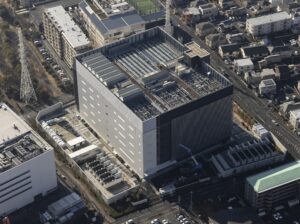StarHub has entered what it calls the “next-gen broadband war” with its latest fibre-based broadband service plans, joining what is turning out to be a big fight for consumer dollars in a newly-shaken up market.
The “green” camp is charging S$68.27 a month for its 100Mbps fibre-to-the-home (FTTH) plan, which offers 50Mbps uploads and an international link of 15Mbps.
It also offered higher plans, from S$82.18 for a 150Mbps plan up to a crazy S$395.90 for a 1Gbps service, which I’m sure home data centre users will be really interested in. For a comparison with other services unveiled this week, there’s more info here.
Like M1, StarHub is offering its cable customers a three-month trial of its new fibre broadband services, called MaxInfinity. Users can sign up at the Comex show this weekend, or go to a StarHub site (when it’s up in a short while).
In addition to the new plans, StarHub also said that its old cable modem services, which now look unattractive because of their high prices.
Make no mistake about it, the broadband market has become more competitive, with better deals out in just a few short days. It’d be interesting to see the action at this weekend’s Comex show.






Hi, might not be so relevant here, but could someone advise if there is a good cable modem cum wireless broadband router (2-in-1) device available in Singapore? Thank you so much!
outside of the big 2 companies, competition will depend on whether ISPs start offering fibre broadband at lower speeds and prices as seen by M1 decision to offer 25mbps service. Both M1 and pacnet (if pacnet enters into the market) could have the most influence on competition. They can leverage on their existing subscriber base and should be able to scale up operations because of the experience they have. However should companies decide to stick to the higher end market, prices at entry to mid point of the market are less likely to be affected since the alternatives are cable and adsl broadband. Factors like activation and hardware cost, the length of contract also comes into play. At the high end, value add services are likely to be the draw since many don’t use those kind of speeds and demand for that needs to be created.
@ William, yes, as I pointed out yesterday, Singapore’s prices are still some way off what HKers enjoy. But it’s a start. With competition – can we say we had any like this in years? – things will get better. They already have, but I think when the entire island is wired up by 2012, things will hot up.
@ Charles, I think it’s an improvement – as a result of the competition – that SingTel and StarHub have come out and listed the overseas bandwidth on the plans. Whether this translates to real throughput increases, we’ll have to test and see. But it’s still an improvement in transparency of prices compared to the past, when we don’t even know what we are getting.
The problem with overseas content is not with the telcos who are offering bigger local pipes – you have to take it up with overseas download sites or other content sites that throttle each user’s bandwidth based on usage.
The other good thing about the new plans is faster uploads. Whether you are sending a file to YouSendit.com or opening up your NAS for friends as an FTP server, the benefits are real.
@ Hun Boon, StarHub said today they would consider upgrades for people under contract. But as I understand, there is no blanket rule – possibly case by case, depending on the promotion you’re currently on.
hi Alfred,
Do you know if existing broadband customers can upgrade without penalty to the optic fibre plans with their existing providers?
Thanks
Hun Boon
RRRRRZzzzzzzz, RRRRRRZZzzzzzzz, RRRRRZZZZzzzzzz
[Wake me up when the bandwidth can be used to access the outside world].
Hang on a sec… wasn’t NGNBN supposed to bring SGP up to speed/price with other markets like HK?
Let’s see now: S$395.90/Month for 1 Gbps
In HK, Hong Kong Broadband Offers Symmetric 1 Gbps for US$26/Month…